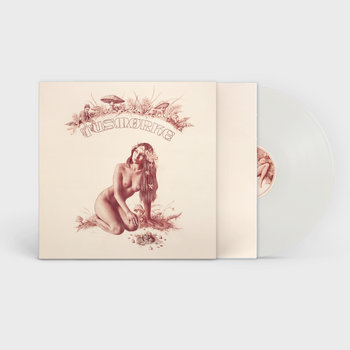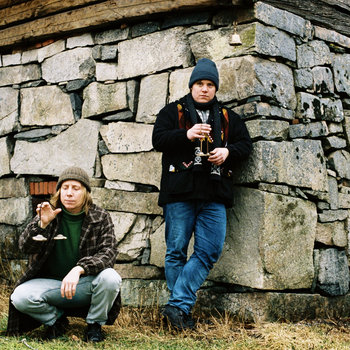
By the dawn of the 1970s, progressive rock was a major force in its native United Kingdom. Bands like Pink Floyd, King Crimson, and Yes took the psychedelic ambitions of the acid-era Beatles and twisted them into something stranger, grander, and more obsessed with virtuosic musicianship. Before punk came along to rail against it, prog was a youth movement, attracting curious teens who wanted something a bit more outré than the pop-oriented rock music they could hear on the radio. Parallel prog booms soon exploded around the world; the Canadian power trio Rush became one of the era’s biggest rock bands, and an adventurous Italian scene flourished, led by the likes of Premiata Forneria Marconi and Banco del Mutuo Soccorso.
One ’70s prog scene largely unsung outside of its home region belongs to Norway. Albums like Junipher Greene’s Friendship, Ruphus’s New Born Day, and Aunt Mary’s Janus blended the off-kilter stomp of early prog with Scandinavian folk music, but they didn’t make much of a commercial impact outside of their home country. By the early ’90s, the center of the Scandinavian prog universe had moved to Sweden, where bands like Änglagård and Anekdoten plied their trades. But something was stirring in the rehearsal spaces and rock clubs of Oslo and Bergen. It took a few years for its influence to be fully felt, but White Willow’s 1995 debut Ignis Fatuus was the opening salvo in what became a full-blown Norwegian prog renaissance. The album’s combination of folk and symphonic influences, along with its lush chorus of male and female vocals, made it an instant cult classic.
Another early entrant in the Norwegian prog revival was Wobbler, founded in rural Hønefoss in 1999. Founding keyboardist Lars Fredrik Frøislie, who later became a member of White Willow and remains an in-demand session player and producer in Norway, says they started playing prog partly as a provocation.
“When we started Wobbler in 1999, it was like the opposite of what was ‘in,’ what was hip, or whatever,” Frøislie says. “So, I guess, almost out of spite, we were gonna play this music. Because we love it, even though nobody else seems to like it. It was also inspired by Norwegian black metal, and that type of do-it-yourself attitude and don’t-give-a-damn type of attitude, as well.”
Now, almost three decades after White Willow and Wobbler bubbled to the surface, Norway is home to perhaps the strongest progressive rock scene in the world. Many of the bands who make up the scene’s vanguard release their music on Karisma Records, the Bergen-based label founded in 2003 by Robin Mortensen. (Karisma even recently reissued the Ruphus catalog, making explicit the label’s spiritual link to the ’70s bands.) Martin Kvam, Karisma’s longtime label manager, credits a spirit of friendly one-upmanship for the healthy state of Norwegian prog.
“[The scene] is really strong right now,” Kvam says. “It’s not a big scene, but the bands are friends, and they are talking to each other, and inspiring each other, and maybe they sort of compete a little bit, to be better and better and do the next cool thing.”
Frøislie and Kvam walked us through some of the music that’s helped in making the post-White Willow era a golden age for Norwegian progressive rock.
White Willow




2 x Vinyl LP, Compact Disc (CD)


It would be difficult to overstate White Willow’s impact on the development of Norwegian prog rock. When guitarist Jacob Holm-Lupo started the band in 1992, prog was near its critical and commercial nadir; in Norway, it was almost nonexistent. The band breathed new life into an old sound, nodding to the earliest UK prog bands while carving distinctive new paths. (Sara Trondal’s vocals were a particular revelation in a genre often criticized for its dearth of women.) For a generation of Norwegian prog fans, discovering Ignis Fatuus was a lightbulb moment, a realization that this music was still being made—and that it was being made in their own backyards.
“I was writing for a magazine back then, so I got the promo,” Kvam recalls. “That was really exciting, that a Norwegian band, a contemporary band, was doing that stuff.”
“I borrowed the CD in the national library just like a month before Jacob contacted me,” Frøislie says. “So that’s what I was listening to. He asked if I could join the band, so it was a funny coincidence. That was quite a shock, to join, because they were more professional. The first gig I played with them was in France, in front of thousands of people. So that was a huge shock, being the son of a pig farmer.”
White Willow have continued to record music, with a revolving lineup around Holm-Lupo and Frøislie. They’ve released seven studio albums to date, and Karisma released a remastered edition of Ignis Fatuus in 2023. Its homespun blend of Scandinavian folk sounds, verdant atmospherics, and symphonic bombast still sounds as exciting as it did back in 1995.
Gazpacho


Most self-styled progressive rock bands are, at some level, building on the sounds of the ’70s. Oslo’s Gazpacho belong to a group of bands who brought a more contemporary sensibility to the genre in the early 2000s. They’re cousins of neo-prog darlings Porcupine Tree and Marillion, but they also have more than a passing resemblance to the prog-adjacent electronic rock of Radiohead. On 2003’s Bravo and 2007’s Night, Gazpacho, led by vocalist Jan-Henrik Ohme, guitarist Jon-Arne Vibo, and keyboardist Thomas Andersen, deliver a more accessible take on prog than most of their peers. Their songs, though short and catchy, also tend to carry an icy edge of paranoia and alienation. If there is one Norwegian band to show a prog skeptic, make it Gazpacho.
Wobbler








Compact Disc (CD), Vinyl LP, T-Shirt/Apparel




Lars Fredrik Frøislie found his way to the music that changed his life the same way a lot of people do: an older brother’s record collection. “I didn’t really know what genre I was listening to,” he says. “It was kind of everything, from punk to heavy metal to prog. And for me, it was just music I liked, you know?”
Everything changed when, at 15, he saw archival footage of Emerson, Lake, and Palmer performing at the 1970 Isle of Wight Festival. “I saw this crazy keyboard player, which was Keith Emerson, jumping over the organ and all sorts of things,” Frøislie recalls. “It blew my mind. Before this, I knew Rick Wakeman, and was more into Yes. But I was also into the Doors and Led Zeppelin and Black Sabbath. But after I saw that Isle of Wight performance, I started investigating. One thing led to another, and it got more and more obscure.”
The seeds of Wobbler were planted during Frøislie’s teenage dive into obscure prog rock, but there was no expectation that they would grow into a long-running, critically acclaimed band. “We started a new band every second week, at that time,” he laughs. “We had lots of projects. It was a very creative period in time. We made lots of material, which ended up being the first two [Wobbler] albums, basically. It was a very inspiring time. You know, 17 years old, discovering all this obscure Italian prog and so on, and just making shitloads of music.”
Wobbler work methodically. In the 25 years they’ve been together, they’ve released just five studio albums. Their emphasis on quality over quantity ensures that each record feels like a complete, carefully rendered expression of their vision. The one-LP-side-long ’70s epics—songs like Genesis’s “Supper’s Ready” and Van der Graaf Generator’s “A Plague of Lighthouse Keepers”—are a clear inspiration for the band; every Wobbler album has at least two songs that stretch past the 10-minute mark. Within those long, labyrinthine songs, Frøislie and his bandmates pack an almost overwhelming number of musical ideas and textures. Wobbler’s discography feels like an ongoing journey, and 2020’s excellent Dwellers of the Deep indicates that they’re still finding new branches of the path.
Airbag








Vinyl LP, Compact Disc (CD), T-Shirt/Apparel




For the first few years of Karisma Records’s existence, they weren’t a progressive rock label. They released goth, indie rock, electronica, black metal, and anything else Robin Mortensen and Martin Kvam found interesting. Airbag’s 2009 debut Identity, quite appropriately, gave the label its identity.
“The first Airbag album really did well,” Kvam says. “It still sells well. So that was an opening, and we sort of found our audience—or Airbag’s audience, more or less. And we knew that there was a lot of other stuff brewing around in Norway, and slowly, more and more came to us, or we found them.”
Founded in Oslo in 2004, Airbag play a spacey, melodic, guitar-driven take on prog. (“They have been linked up [compared] to Pink Floyd a couple of times,” Kvam drolly notes.) Lead guitarist and co-vocalist Bjørn Riis embraces his David Gilmour role with relish, and he’s responsible for some of the most striking moments of beauty in Norwegian prog. 2020’s A Day at the Beach is Airbag’s fifth full-length, and it’s their most accomplished work yet, marrying Riis’s Floydian guitar pyrotechnics to the jittery, heavy thump of mid-2000s Porcupine Tree.
Tusmørke






Vinyl LP, Compact Disc (CD)




Tusmørke are almost certainly the strangest band in Norwegian prog. Their sound is a potent brew of Nordic folk, ’60s psych-prog, and cosmic Krautrock. They’ll sound like Jethro Tull one moment and Popol Vuh the next. Midway through the title track of 2023 album, Hestehoven, they launch into a bizarro synth mashup of “My Favorite Things” from The Sound of Music and Jennifer Lopez and Pitbull’s “On the Floor.” That’s pretty much par for the course. More than any of their peers in the Norwegian scene, there’s a thrilling sense with Tusmørke that things could truly go off the rails at any moment.
Jordsjø


Compact Disc (CD), Vinyl LP




The duo of Håkon Oftung and Kristian Frøland have only been collaborating for about a decade, but in that time, they’ve released seven albums of freewheeling, fluid prog rock. They’re clearly inspired by the prog-folk tradition, but their music also frequently and proudly wears its jazz influences on its sleeve. The bass clarinet on 2021’s Pastoralia owes a debt to Eric Dolphy, and Oftung’s flute serves as the lead instrument at least as often as his guitar. On their 2023 album Salighet, Jordsjø find a meeting point for their jazz, folk, and prog influences, bringing them together in an intoxicatingly atmospheric swirl.
Lars Fredrik Frøislie





Vinyl LP, Compact Disc (CD)



Progressive rock has always been adaptable when it comes to instrumentation, but it’s still fundamentally rock music, which historically means it’s guitar music. The thrill of Lars Fredrik Frøislie’s solo debut, Fire Fortellinger, is hearing prog rock played without any guitars. Rather than hire a guitarist to help flesh out the album, Frøislie put his massive collection of vintage keyboards to work, creating a symphony of sounds as audacious as anything in prog history.
“Instead of guitar, I used this clavinet through an amp, or the organ with a fuzz pedal, or the Chamberlin instead of an acoustic guitar,” Frøislie says, by way of example. Altogether, he’s credited with playing 17 different instruments on the album, from prog’s ubiquitous Mellotron to harpsichord, Minimoog, and Rhodes piano. Frøislie originally played the album’s basslines on a synth, too, but at the last minute, he invited Nikolai Hængsle of BigBang to add some meaty Rickenbacker riffs.
Frøislie was in his home studio during our interview, and he lit up like a kid on Christmas morning while showing me his instruments. Sitting at his Chamberlin—a kind of precursor to the Mellotron—he waxed poetic: “I can feel the tapes move up here, when I touch, and if I touch a little lighter, it starts to wobble. It’s not like a digital sample. They’re more alive, and random things happen. It’s very inspiring to play. Even the smell of the Chamberlin…”
Fire Fortellinger is precisely the kind of album made by someone who goes into a state of reverie while talking about an old instrument’s smell. Frøislie’s work in Wobbler and White Willow is what he’s best known for, but Fire Fortellinger feels like the truest expression of his musical soul yet.
The Chronicles of Father Robin




Vinyl LP, Compact Disc (CD)


The Chronicles of Father Robin’s The Songs & Tales of Airoea serves as a kind of capstone for the past three decades of Norwegian prog history. The personnel for the trilogy of albums is like a scene-hall-of-fame list: members of Wobbler, Jordsjø, Tusmørke, Les Fleurs du Mal, The Samuel Jackson Five, and more all make appearances. Father Robin isn’t a supergroup in the traditional sense, though. While The Songs & Tales of Airoea is only now coming out, its origins predate the success of all those other bands.
“It’s more or less 30 years in the making,” Karisma’s Martin Kvam says. “The original band, they met at school. They have been working on this, and the project has just become bigger and bigger and bigger over the years. There have been pauses. They haven’t done it all the time, but they have had a really focused last few years to finish it. It’s a huge piece of work, but it’s fun. And the trilogy is really good.”
The Father Robin albums could be a mess, with so many voices contributing and so many years of tinkering. Instead, the Airoea trilogy is one of the most satisfying bodies of work the Norwegian prog scene has ever produced. Wobbler frontman Andreas Wettergreen Strømman Prestmo and Oslo Philharmonic singer Aleksandra Morozova trade vocals like the members of White Willow did on the foundational Ignis Fatuus album. Jordsjø’s Håkon Oftung and Tusmørke’s Kristoffer Momrak weave in and out with wild, expressive keyboard lines. Frøislie is here, too, as a guest musician, lending his enormous library of synthesizer sounds to the project. His sessions took place back in 2010, and he only listened back to them last year as the plan for the trilogy started to take shape.
“I hardly remembered what I did, you know? And I would probably play differently now,” Frøislie says. “I’ve changed, perhaps. But it’s got this youthful playfulness, I think. And it’s very cool to finally see it happen.”








